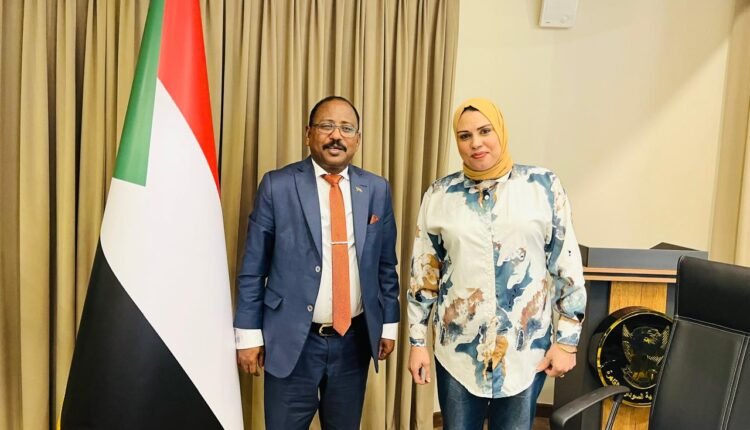Sudan Justice Minister: We Are Studying International Litigation Through Other Legal Channels

Cairo – Sudanhorizon – Sabah Moussa
Sudanese Justice Minister Dr. Abdullah Darf has accused the international community of silence and an immoral stance regarding the violations committed by the Rapid Support Forces (RSF) militia in Sudan.
Darf stated in a meeting with a number of Egyptian journalists in Cairo on Wednesday, that international silence has given these mercenaries the opportunity to continue committing more crimes and atrocities, as happened in El-Fasher and previously in Khartoum, Al-Gezira , and other cities they entered.
He added that this silence will remain a stain of human shame that will haunt all those who remained silent. He pointed out that the main reason behind this silence was the presence of the UAE and its support for the militia.
He said the international community could have forced the Abu Dhabi government to stop what it has been committing against the Sudan and inside the Sudan, and without its support, the RSF would not have continued for so long.
The minister added, “Our primary mission is to stand behind the armed forces, which have witnessed unprecedented support from the Sudanese people,” emphasizing that the people are unbreakable.
The minister then presented a short film about the grave violations committed by the militia in El Fasher, calling for assistance in conveying the victims’ voices to international organizations to ensure justice and accountability.
International Litigation:
Responding to questions by the Sudanhorizon about the Ministry’s efforts to monitor the violations in El Fasher and submit them to international legal and human rights organizations, the Minister stated that they are studying the possibility of taking international litigation measures based on various justifications and other legal avenues.
He added that they have submitted complaints to human rights organizations, pointing to the significant international attention following the crimes in El Fasher. He said that what happened in El Fasher has generated clear momentum and strong condemnations of foreign interference.
He explained that there is a specialized national committee monitoring all these violations and crimes, pointing to Britain’s request to the Human Rights Council to hold an emergency session and a draft law to refer the investigations into the El Fasher violations to a fact-finding committee.
Darf added that his ministry has reservations about the work of this committee due to its lack of impartiality and the reports it submits, which equate us with the militia. “Furthermore, we have reservations about the inaccurate information it obtains from unofficial sources affiliated with the Rapid Support Forces.”
He accused these institutions of being manipulated by specific countries through funding and stated, “We will not accept this committee.” He added that international organizations must take action on their own initiative regarding the crimes that have occurred in Sudan in general and in El Fasher in particular, indicating that there are accusations against ninety militia leaders who have been charged, and these charges have been finalized for trial.
He said, “We expect verdicts against them,” denying any charges or trials against politicians. He stated, “We do not prosecute anyone for their opinions, and we have no desire to try any politician. However, we condemn those who are complicit in crimes.”
He added that the state can pardon these crimes according to the law, and the Chairman of the Sovereignty Council has the right to grant amnesty to anyone who has committed a crime against the public.
The government is open:
The minister pointed out that the Sudanese government is open to any initiatives, regardless of their nature, and that the true test lies in whether these initiatives address the concerns of the Sudanese people. He added that the government will submit a written response outlining its conditions regarding the Quartet’s proposal, emphasizing that the positions of Egypt and Saudi Arabia are commendable, while simultaneously criticizing the UAE’s involvement in this initiative.
An Important Platform:
The Minister addressed the 41st session of the Council of Arab Ministers of Justice, chaired by Sudan, commending the work of the Executive Bureau and the Technical Secretariat for their efforts in preparing for this session.
He also praised the role of the Secretary-General and the General Secretariat of the League of Arab States in advancing joint Arab action and consolidating the rule of law by supporting justice institutions in Arab countries. This support, he noted, has strengthened the unified Arab position on legal and judicial matters.
He reiterated Sudan’s commitment to cooperation, upholding the values of justice, and unifying legal perspectives to achieve integration and cooperation within the framework of joint Arab action. He emphasized that this session is particularly significant given its timing, the events on the agenda, and the topics of discussion.
The challenges range from foreign interference and Arab security issues to economic and social challenges, all of which impact the unity, stability, and cohesion of Arab states. He considered the Council of Arab Ministers of Justice an important and influential platform in all legal and judicial fields, enabling it to keep pace with developments. He stressed the importance of activating all its mechanisms to achieve joint Arab integration.
Unprecedented:
The minister affirmed that the Sudanese people are facing an unprecedented aggression in the country’s modern history, and that the terrorist Rapid Support Forces militia, its mercenaries, and its supporters are committing brutal massacres against unarmed civilians, including genocide, ethnic cleansing, looting of public and private property, forced displacement of citizens, and destruction of infrastructure.
He added that every crime against humanity has been committed against unarmed civilians, as witnessed by the world through live broadcasts of all these crimes, without any regard for international humanitarian law, human values, or international norms.
He called for the condemnation of these terrorist acts and the need to hold their perpetrators accountable.
Shortlink: https://sudanhorizon.com/?p=8705

